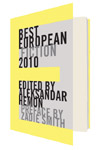In one of the biographical statements in Best European Fiction 2010, the debut of an annual series, Giedra Radvilavičiūtė says, “there aren’t any geographically specific literatures,” only good or bad writing. In this collection, locales often appear like artifacts or facades, ephemeral and illusory. Landscape is something one travels through unseeing, conflicted or dangerously lost. So what do these stories share if geographical specificity is not salient? They are irrepressibly various. In “Friedmann Space,” Victor Pelevin conjures a “proven method of seeing into the world of the megarich.” The assassination of your fellow citizen is a right doled out by the state in Peter Terrin’s “The Murderer.” A phantasmal headbutt provides an opportunity for Jean-Philippe Toussaint’s exquisite, existential meditation in “Zidane’s Melancholy,” while threatening vegetation encroaches upon breakfast with an imaginary Haruki Murakami in Christine Montalbetti’s “Hotel Komaba Eminence.” These stories address the absurdities of power, the frail surliness of family, the brutalities of class, the prophetic valences of language, the comedies of unwitting transgression, and the unreliability of perception.
In “Foreign Women” by Elo Viiding, one of the gems of the collection, local mothers’ mute complicity in their own subservience is vividly contrasted with the self-determined verve of the “foreign women” their poet husbands sleep with. The story exposes the ways in which ideas of cultural authenticity (as projected upon the visages of cowed women) can both mask and underwrite male privilege, an interpretation that springs from Viiding’s devastatingly precise description and which speaks to the power of killer fiction to argue by inference.
Despite the wide range of these stories, there are persistent stylistic recursions here, notably parody, gallows humor, and digression. The dead don’t stay dead, fame inexorably entails a bargain with the devil, virginity is ideology, and dolphins are killed at cocktail parties. Perhaps we can agree that what a writer is given to imagine and how they are disposed to set it down is not entirely unrelated to where (and when) they are coming from (if we are from a place, we are also from a time, as well as a language), albeit such contingencies are arbitrary. Under censorship, for example, writers resort to coding with geographically specific (i.e., politically and historically specific) meanings and effects. Or, to take another example, in the US, new fiction is produced largely under the auspices of MFA programs and is thereby pressurized by the relatively (insert adjective here) standards of workshop. Europe invented modern imperialism, capitalism, and ideology, reaped the criminal spoils of global empire, and suffered two world wars. The antic exorcisms, formally restless and liberating disenchantments enacted here could be said to result, in some part, from such a complex legacy. Or to put it another way, these writers know and care about the difference between fiction and propaganda.
But perhaps this is reductive when a signal attribute of the “best” writing is its immunity to any one interpretation and its potential to produce numberless readings. If that’s so, then this collection is aptly named. Editor Aleksander Hemon declares in his preface that at the heart of this compilation is the “non-negotiable need for communication with the world, wherever it may be,” and asserts that ongoing translation is crucial to this process. The English-language reading world, “wherever it may be,” is grateful.





